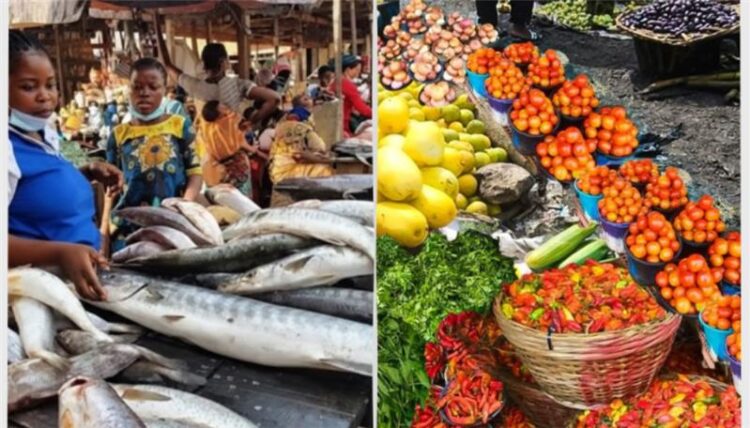Discover the top 10 food markets in Lagos powering the city’s ₦16 trillion food economy, including Mile 12, Oyingbo, and Oluwo Fish Market
Feeding over 17 million residents is no small feat, but Lagos, Nigeria’s commercial powerhouse, does so through a massive and intricate network of food markets.
Also read: Nigeria-Brazil agricultural agreement sparks major leap in food security
These hubs are the lifeblood of the city’s food supply, sustaining homes, fuelling trade, and shaping prices across the state.
According to Governor Babajide Sanwo-Olu, Lagos consumes over 50% of all food traded across the South-West, with its food economy valued at ₦16.14 trillion.
The Commissioner for Agriculture, Abisola Olusanya, puts daily market transactions at around ₦9 billion, exceeding ₦5 trillion annually.
Below are the 10 largest and most critical food markets in Lagos that keep the city fed:
1. Mile 12 Market (Kosofe LGA)
Arguably the most important wholesale market for perishables in Lagos, Mile 12*supplies over 60% of the city’s vegetables.
Trucks from Kaduna, Kano, Benue, and Plateau arrive daily with tomatoes, onions, carrots, and yams. It’s the go-to for bulk buying of fresh produce.
2. Oyingbo Market (Mainland)
Located near Ebute Metta, Oyingbo is a major centre for frozen fish and general foodstuffs. Reconstructed in 2015, it now boasts a modern multi-level structure.
Prices here influence fish markets across Lagos. It’s also a reliable destination for meats, fruits, and dry goods.
3. Mushin Markets (Mushin LGA)
Mushin is home to multiple key markets:
- Ajino – fresh peppers, onions
- Ojuwoye – grains and provisions
- Daleko – wholesale rice
- Idi-Oro Agro-Hub– new in 2023, recorded ₦2.49bn in first-year transactions
This cluster makes Mushin one of the most diversified food trading zones in the city.
4. Makoko Seafood Market (Yaba)
This lagoon-side fishing community is one of Lagos’s oldest seafood centres.
Canoes bring in fresh fish, prawns, snails, oysters, and periwinkles daily. It’s a vital local supply point for both retailers and homes.
5. Oluwo Fish Market (Epe)
Known as Epe Fish Market, this is a regional seafood giant. It’s predominantly run by women and offers a variety of fish and crustaceans, from catfish to lobsters.
Epe’s long fishing tradition has helped grow this market into a major inter-state trading post.
- Ounje Eko Food Markets (Statewide)
Launched by the Lagos State Government in March 2024, these discount food markets aim to cushion the impact of food inflation.
Selling rice, beans, garri, eggs, and more at subsidised prices, they operate in all 57 LGAs and LCDAs.
7. Ijora Fish Market (Apapa Axis)
Close to the Apapa Sea Port, this seafood market receives fish daily—some still alive in tanks for freshness.
It supplies tilapia, mackerel, prawns, and barracuda, serving restaurants and individual buyers across the city.
8. Ile-Epo Market (Abule Egba)
Also known as Oja Oba, this market is vital for yam, garri, and rice. Located along the Old Abeokuta Expressway, it’s a blend of wholesale and retail, connecting Lagos with Ogun and other neighbouring states.
9. Oko-Oba Abattoir (Agege)
A critical player in Lagos’s meat supply chain, Oko-Oba processes cows, goats, and sheep for distribution to butchers and eateries citywide.
Its well-structured layout allows for live animal sales, slaughtering, and distribution—all under one roof.
10. Sabo Market (Ikorodu)
Serving Ikorodu and neighbouring towns, Sabo sells both perishable and non-perishable foods, along with textiles and second-hand goods.
Its strategic location on Ikorodu-Epe Road makes it a vital access point for food entering Lagos from eastern borders.
These markets are not just trading points—they are community lifelines, economic engines, and inflation regulators.
Whether it’s the subsidised Ounje Eko stalls or the century-old fishing docks of Makoko, each plays a vital role in the city’s food security and economic stability.
Also read: ‘To our fallen volunteers’ Zulum offers scholarship to orphans, donates N180m, foodstuffs
As Lagos continues to grow, these markets—and the people behind them—remain essential to its future.
Source: Read more at www.wikipedia.org




























